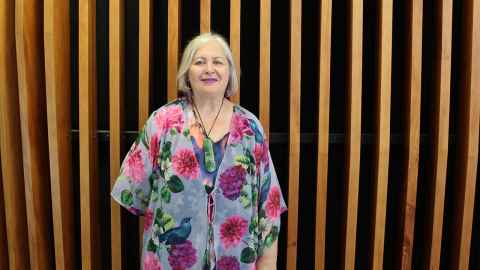Online exhibition remembers whānau who died during lockdowns
29 June 2022
A University of Auckland interactive online exhibition aims to increase awareness of the impact of Covid lockdown restrictions experienced by Māori, particularly around end-of-life care and tangihanga.

The exhibition, ‘Rapua te Mārama – Whānau reflections on life and death during Covid-19 Lockdown’ will showcase Māori whānau portraits, and stories about end-of-life care, dying, tangihanga and bereavement during Covid-19 lockdowns. It was developed by PhD candidate Ali Taheri with support from Te Ārai Kāhui Kaumātua Advisory Group and opens on 2 July.
The study was led by Dr Tess Moeke-Maxwell , Research Fellow, School of Nursing, from the Faculty of Medical and Health Sciences and included the late Matua Rawiri Wharemate who passed away in 2021. The study was an initiative through the loss of one-day-old Te Minaora Raukawa, the moko of Moeke-Maxwell, during an Alrt Level 4 lockdown, 2020.
Dr Moeke-Maxwell said that many New Zealanders experienced a whānau death during the pandemic, and that the restrictions interrupted tikanga and kawa practices that whānau use to support caregiving, dying and grieving.
“Whānau grief has been exacerbated by an inability to practice traditional tangihanga,” she said.
“The impact of restrictions was profound for Māori as the policies severely limited cultural and spiritual end-of- life practices compromising a collective whānau presence and the ability to carry out tikanga related death customs.
“There is already evidence that Māori face inequities in accessing timely and culturally appropriate palliative and end of life care. However, the Rapua te Mārama study provides new information that highlights how the pandemic exacerbated whānau experiences.”
Whānau grief has been exacerbated by an inability to practice traditional tangihanga.
The study explored challenges and gaps in palliative care provision, and the ways whānau Māori effectively used and adapted their tikanga (customs) and kawa (protocols), to carry out end of life care and post-death care. Its findings will provide information to support whānau who may be called upon to provide end of life care during future pandemics. It is also intended to help shape the future of health planning and will inform pandemic policy.
In all, 25 whānau, 17 funeral directors, 21 health professionals and two community leaders throughout Aotearoa New Zealand participated in an interview from Matauri Bay to Bluff. Kaupapa Māori community-based participatory research methods, involving key stakeholders, were used throughout the research process, aligning the project with existing policy initiatives, and using creative methods of engagement and dissemination.
Although the exhibition is initially online, later in the year the whānau portraits and stories will be showcased in presentations at eight sites around Aotearoa New Zealand. An exhibition book will be published and a downloadable version will be available on the Te Ipu Aronui website.
The University of Auckland’s former kaumātua Rawiri Wharemate (Ngāti Wai, Ngāti Moerewa, Ngāpuhi) and the Te Ārai Kāhui Kaumātua Advisory Group supported the need for this Covid-19 study. Wharemate named the project before he passed away in 2021. Rapua te Mārama expresses gathering the light and to become enlightened about how Covid-19 impacted whānau.
Online Exhibition
Rapua te Mārama – Whānau reflections on life and death during Covid-19 Lockdown
Opens: 2 July 2022
URL: www.teipuaronui.co.nz/virtual-exhibition
Media enquiries:
Dr Tess Moeke-Maxwell | Research Fellow (Principal Investigator)
School of Nursing, Faculty of Medical and Health Services
M: 021 2404666
E: t.moeke-maxwell@auckland.ac.nz
or
Te Rina Triponel
Media Adviser, Māori
E: te.rina.triponel@auckland.ac.nz